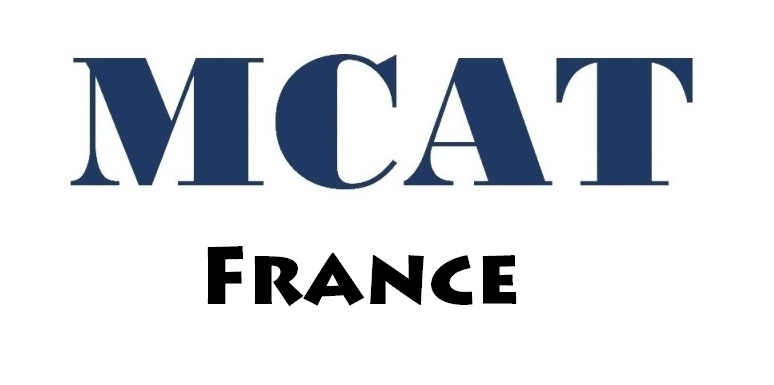According to AAMC (the MCAT test maker), there are 1 MCAT test centers in France. Most testing centers are located inside a college or university. You can select a testing location that is nearest to you. Please note that you are able to choose a test center when registering for the MCAT.

PARIS ITTS, FRANCE
ITTS, c/o Domicila Centre d’Affaires
1st Floor, 149 Rue St. Honore
Paris, France 75001
More about France
Population and Religion
France has 67 million residents (2017). It is far less densely populated than its neighboring countries. Almost a fifth of the population lives in and around the capital Paris. The metropolitan areas of Lyon, Marseille and Lille each have more than 1 million people. Since the middle of the 20th century, rural regions have lost many residents. Some villages, for example in the Massif Central, are completely deserted.
More than a tenth of the population was not born in France. Many immigrants come from the former French colonial areas in North and West Africa. They often live in the suburbs of the metropolises, the banlieues. A lack of integration and social problems have repeatedly led to violence there.
60% of the French are Catholics, but very few go to church regularly. France has a large Jewish community. The proportion of the population of Muslims is among the highest in Europe. State and church have been strictly separated since 1905 (secularism). Religion is seen as a private matter. That is why there is no state religious education. It is also forbidden to wear conspicuous religious symbols in schools. The faith communities have to finance themselves to a large extent.
The French have a strong national consciousness, which also includes cultivating the French language. In addition to dialects, non-French regional languages have also been preserved in peripheral areas: Occitan, Catalan and Basque (Basque) in the south, Italian around Nice and in Corsica, Breton in Brittany, Flemish in French Flanders and German in Alsace. Arabic is also common in immigrant families.
The French social system is well developed. Low-wage earners and families in particular benefit from this. Compared to other European countries, there is generous support for children. The differences between rich and poor are about as great as in Germany. However, more taxes and social security contributions are paid. After a voluntary pre-school, which almost all three-year-olds have attended since the 1990s, pupils from the age of 6 attend primary school for six years, followed by a four-year college, which corresponds to lower secondary level. Most of them then go to high school, the Lycée, and do their Abitur, the baccalauréat. Preschools and schools are free all-day facilities. Around every seventh elementary school pupil and every fifth secondary school pupil goes to a private school, for which school fees have to be paid. In addition to state and private universities, there are the grandes écoles with strict entrance exams. They are considered elite schools. Most senior administrative officials and politicians often attended the École Nationale d’Administration (ENA) in Strasbourg. However, it should be dissolved.
Politics and law
France is a democracy with a president as head of state. He appoints the government, determines foreign and defense policy and is Commander-in-Chief of the Army. He can also issue ordinances and veto laws passed by parliament. The president, E. Macron since 2017, is directly elected by the people for five years. Re-election is possible. The Prime Minister and his ministers form the government. Although the government is dependent on the confidence of parliament, the executive has a stronger position than the legislature in the so-called semi-presidential system of government in France.
The parliament consists of the National Assembly and the Senate. Both form the legislative power, the legislature. The National Assembly is the representative body. Its 577 members are elected for five years according to the majority vote: Anyone who receives more than 50% of the votes is elected – if not in the first round, then in a runoff election (election). You can vote at the age of 18, and you can become a member of parliament from the age of 23. The 348 members of the Senate are elected for six years at the administrative level of the departments by electoral colleges. Half of the Senate seats are filled every three years. The 96 departments are the administrative units below the 13 regions. Both have been given powers since 1982 that previously resided with the government in Paris and their administrators in the departments, the prefects.
There are three other high state organs of the republic: The constitutional council of nine members examines whether laws comply with the constitution. The State Council forms the highest administrative court and, like the Economic and Social Council, advises the government.
The party system is broad and, since the founding of the Fifth Republic in 1958, has been divided into a “right” block around bourgeois-conservative parties and a “left” block around the socialists. These blocs have lost importance since the right-wing Front National, now Rassemblement National, gained influence in the 2000s and the Macron movement La République en Marche became the strongest party in the National Assembly in 2017. President Macron initiated a reform policy aimed at making France more internationally competitive and improving the employment situation. However, this also led to public protests, such as the so-called yellow vests against tax increases for motorists in 2018/19.
France is a founding member of the Defense Alliance NATO and the European Union. As the owner of nuclear weapons, it is a permanent member of the UN Security Council. His army with 203,000 soldiers also has bases abroad, often in the French-speaking countries of Africa. This also includes the Foreign Legion. There is intensive political cooperation with Germany, which has primarily advanced European unification, such as the creation of the euro zone.
